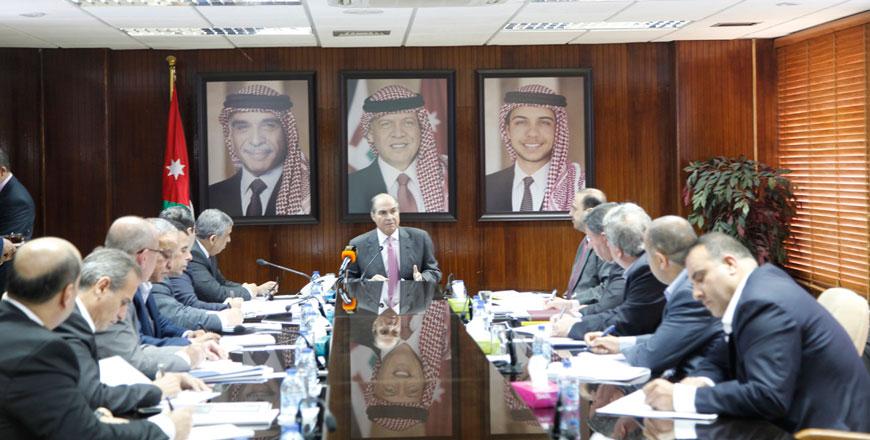You are here
‘Nothing will stand in way of Red Sea-Dead Sea water desalination project’
By JT - Apr 11,2018 - Last updated at Apr 11,2018

Prime Minister Hani Mulki discusses the water situation in Jordan with officials at the Ministry of Water and Irrigation on Wednesday (Petra photo)
AMMAN — The government will "go ahead" with implementing water desalination projects and will "not wait for anyone", Prime Minister Hani Mulki said on Wednesday.
Mulki stressed the importance of guaranteeing justice in water distribution to all areas of the Kingdom and of safeguarding water resources, the Jordan News Agency, Petra, reported.
The prime minister's remarks came during his visit to the Water and Irrigation Ministry where he had a firsthand look at plans to deal with water provision in 2018, as well as the summer plan and projects the ministry is expected to implement.
Mulki noted that the government, through the ministry, seeks to implement several water schemes to ensure the provision of enough amounts of water for various purposes in the coming years.
He called for proper administration of water resources in the Kingdom in light of increasing demand due to an expected good tourism season and soaring temperatures, in addition to the impact of the Syrian refugee crisis.
The premier also highlighted the importance of expanding desalination projects to cope with increasing demands on water, citing the successful project implemented in Aqaba and expected to provide 5 million cubic metres (mcm) of water for industrial and tourist investments annually, Petra added.
Jordan signed a memorandum of understanding with Israel and Palestine in December 2013 to implement the first phase of the Red Sea-Dead Sea Water Conveyance Project.
Under the first phase, a total of 300mcm of water will be pumped each year, eventually transferring up to 2 billion cubic metres of seawater per year from the Red Sea to the Dead Sea, according to the Ministry of Water and Irrigation.
A total of 85-100mcm of water will be desalinated every year, while the seawater will be pumped out from an intake located in the north of the Gulf of Aqaba.
In November last year, Israeli media reports claimed that Israel had told Jordan that a joint agreement for the construction of a pipeline transferring water from the Red Sea to the Dead Sea would "not go ahead" until Israel would be allowed to reopen its embassy in Amman.
In February 2018, Jordan stressed its commitment to implementing the Red-Dead Project despite repeated withdrawal signals from Israel.
During Mulki's visit, Water Minister Ali Ghezawi reviewed the main challenges facing the water sector, especially the gap between the available and required amounts of water, the repercussions of the Syrian refugee influx, climate change and the increasing demand during the summer due to receiving tourists and the return of expatriates.
Ghezawi added that rainfall averages have been witnessing increasing decline over the past few years, noting that this year's rainfall average did not exceed 78 per cent of the annual general average of 8.4 billion cubic metres, according to Petra.
He highlighted that such low rainfalls affected dam storage, which went down by more than 30mcm of this year's storage capacity of 133mcm, amounting to 39 per cent compared to 50 per cent registered last year, where storage capacity stood at 162mcm.
The minister pointed out that work is underway to raise dam storage capacity to 400mcm by 2020.
Related Articles
AMMAN — The Ministry of Water and Irrigation has invited proposals for providing technical, legal, financial and transactional consulting se
AMMAN — The Red Sea-Dead Sea Water Conveyance Project is still on the agenda, despite Israeli procrastination, Prime Minister Omar Razzaz sa
AMMAN — Jordan is committed to implementing the Red Sea-Dead Sea Water Conveyance Project despite repeated Israeli signals that it was withd
















